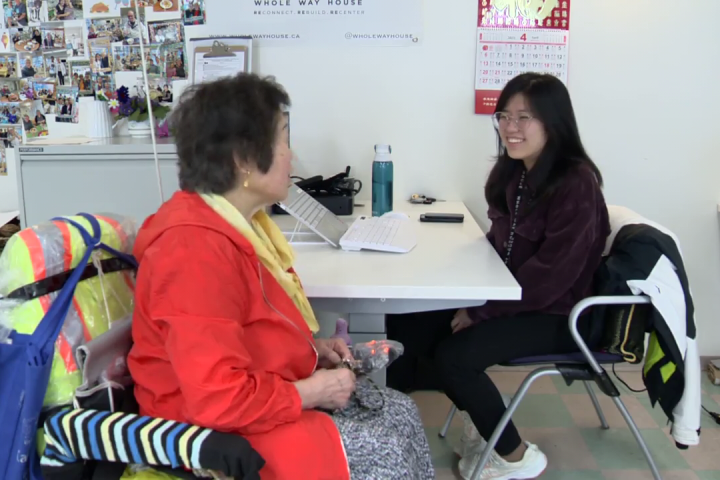Hundreds of vulnerable seniors could be left without supports that help them live independently, after the province cut funding to a pilot project with under two weeks notice, a B.C. charity says.
Whole Way House says it was supporting more than 400 Metro Vancouver seniors through the Seniors Enhanced Independent Living pilot project, a partnership with BC Housing. Whole Way House president and co-founder Jenny Konkin said the $421,000 funding went to a variety of services that allowed low-income seniors to age in place. Those supports range from rides to the food bank to coordinating medical appointments and treatment to helping with government forms or language translation.

“There’s this big gap right now between housing and health, and if you are a senior living in independent subsidized housing and you are no longer independent but you don’t qualify for long-term care, there is nowhere for you to go,” Konkin said. “We are seeing more and more seniors in the streets, in shelters, living in their cars — 22 per cent of our homeless population in metro Vancouver are seniors. So we are working hard to prevent that from happening.
” Konkin said the program, which has run for three years, was designed to work as a proof-of-concept with the goal of spreading similar home support services to seniors around B.C. But she said in late March, the group was given just 11 days notice that the funding was being pulled.
“I was panicked, I actually felt devastated. To work with such a great partner for so long and then to have the rug pulled out from under us,” she said. “When budget cuts are made, they need to know who it affects.
This affects 400 seniors ...
They matter, they are a big part of our province. And to think we are leaving them hanging just breaks my heart.” Low-income senior Georgette Gibson said her connections with Whole Way House have been “life-changing.
” She said the group provided a lifeline during COVID-19 by delivering meals to residents of her building’s doors. They maintain a presence in the building, which she said helps residents with a variety of day-to-day needs. “They are amazing people, first off they help everyone who is able to come down and if they have a problem they are right there to help them all the time,” she said.
“I was even in the building when one of my close friends broke his arm and didn’t know what to do ...
and one of the people downstairs drove him all the way to the hospital.” Housing Minister Ravi Kahlon said the program’s funding was delivered through a one-time grant that has since expired, and that the province is still offering community health services to seniors that are “very similar to this organization.’ “It was made clear to this organization when they got the one-time grant, that it was a one-time grant,” he said.
” “But the supports are the most important piece, and Community Health Services provides that right now to all seniors that need it.” Konkin said that doesn’t tell the whole story, and that while the program has relied on fresh grant funding every year, it was expecting the creation of a permanent revenue stream after the pilot proved the initiative’s concept. “The research project wasn’t finished yet, and so to cut it off before we’re complete feels actually like we’ve wasted money,” she said.
She said the program is unwilling to stop supporting its clients, and is currently running off savings and donations. But she argued that the pilot program offered the province bang for its buck, and that cutting it off will put vulnerable seniors at risk. “We have seniors who are on the verge of eviction, who are on the verge of homelessness, who we are able to actually work with landlords, help them to stay independent, and get them the home support and medical care they need so they can stay housed,” she said.
“We are seeing the cost of homelessness is about $275 per person per day. So this is a very cost-effective way, not to mention dignified.”.
Top

Funding cut could leave vulnerable seniors at risk of homelessness, B.C. charity says

A B.C. charity says provincial funding it relies on to help keep vulnerable seniors from homelessness was cut this year with just 11 days notice.











